
Publisher:
Bonnie King
CONTACT:
Newsroom@Salem-news.com
Advertising:
Adsales@Salem-news.com

~Truth~
~Justice~
~Peace~
TJP
May-03-2023 01:01


 TweetFollow @OregonNews
TweetFollow @OregonNews
Oak Flat: The Story Behind the Story
Mahlee Yellowfeather, Great Granddaughter of Geronimo
Robert Lundahl special to Salem-News.com
Mahlee Yellowfeather was raised in a back canyon, speaking only Apache. She was taught by the Elders.
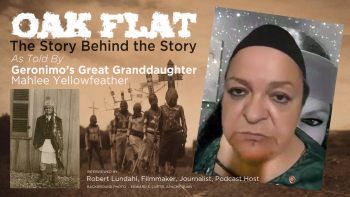 |
(LOS ANGELES, Calif.) - Mahlee is the great granddaughter of Geronimo. Geronimo's raids and related combat actions were a part of the prolonged period of the Apache–United States conflict.
Here she tells of the occurrences at Oak Flat, and the meaning of the area to the Apache people. (More coming).
Sometimes stories come to you. My curiosity had been piqued by the contradictions implicit in what we call “Green Energy,” mining cobalt and lithium for electric vehicle batteries, to save the planet by digging huge pits, the depth of several empire state buildings; animals, people, laws, history, water quality, and ecosystems be damned.
It dawns on this writer we are witnessing an era of raw power plays, unmitigated greed, inequitable development, and in at least one case, sheer chaos.
At least we’re going to test that assumption and hope better permitting processes prevail. The “sheer chaos” is best exemplified by the alleged history of Oak Flat, Arizona, where reported raids by international mining enterprises meet Chiricahua, Apache resistance over the development of what has been called the third largest copper ore deposit in the world.
I did not anticipate having a privileged glimpse of the life of Ghailee Geronimo.
Mahlee Yellowfeather is the great granddaughter of the legendary warrior. To her, Oak Flat is a sacred site. She tells the story of how one day, that sacredness was interrupted by an unexpected military incursion.
Illustrating the monetary value of her traditional lands to outsiders, there is an as yet unresolved dispute over law, land, and the right to mine in what has become no less incendiary a conflict of values than an old-time Western land war, continuing the Apache-United States conflicts of the 1800’s, from before the West was “settled.”
According to Mahlee Yellowfeather, the Chiricahua Apache want peace and are moving forward as a people, into a perhaps more powerful and effective position in the modern world of 2023.
The Flat Oak War
EXCLUSIVE INTERVIEW with Mahlee YellowfeatherRobert Lundahl:
What happened exactly, what did you see? When did you first realize that there was a problem that your family had to be involved in?
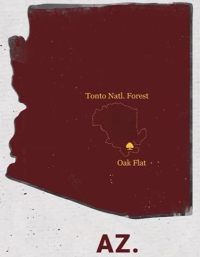
Mahlee Yellowfeather: We had the Flat Oak War. This is where we lost a lot of our members of our family. That's when they came over and they were trying to, well they started bombing us.
That was the really worst one. There that was the first time that they tried to take and take over the mine, and we lost a lot of people there, a lot of family, a lot of relatives, a lot of people in the tribe…
Robert Lundahl: And when was that?
Mahlee Yellowfeather: This was, oh God, it's been like- 20 years ago.
And they say that we inspired Standing Rock, but I don't see where we inspired Standing Rock because we didn't hold signs up in prayer, we fought.
The government was called, and they didn’t deploy till after uh 24 hours while boots were on the ground.
By then we lost biggest part of the tribe.
They had helicopters, tanks, everything, so how do you not know, how does the government not know that they were coming across into the waters into the land to attack us? They did.
Robert Lundahl: I see.
Mahlee Yellowfeather: And the government waited to come and assist us. By that time, we already took them down but we lost so much.
It was a bloodbath.
The Bloodbath
Robert Lundahl: Who were you fighting?Mahlee Yellowfeather: It was people from Australia.
Robert Lundahl: Oh really. So you're talking about the miners. You were fighting the miners.
That's what's going on in Brazil with the Yanomami people and the mining, the miners come in and they come into the indigenous land, and they do what they do.
So that was Rio Tinto?
Mahlee Yellowfeather: Yes.
I just don't publicize it. We don't publicize it. We don't really even talk about it too much due to all the relatives that are not here any longer.
Us Apaches, you know, are very secluded. It was not a very good day. We were all sitting and in celebration ceremonies and next thing you know, we're getting bombed.
Robert Lundahl: What gave them the right? Did they have any right at all?
Mahlee Yellowfeather: From what I understand, the dude had a deal from the 1800s. It was a mining pass from my great-grandfather, Ghailee Geronimo, to his great-grandfather stating that they can mine for a year, and he thought, well, he could take it and run with it again... and it's like, no...
Robert Lundahl: Right.
Mahlee Yellowfeather: No.
Because he would let some people come over and mine, but it wasn't like a whole bunch of miners, you know, it would be like, you know, “okay, oh yeah, you can go ahead and mine for a little bit,” if it was good for the people.
But these companies coming over, they just want to suck them dry. And this is what this guy, (what) his intentions were, and he thought, “Oh he found a piece of paper that his great-grandfather had, that he thinks he could pull (that) and say, “I'm entitled.”
No, you're not entitled to something that was between my great grandfather and your great-grandfather, and that deal is over.
That Deal is Over
Robert Lundahl:
Were you involved in discussions with the Department of Interior at that point, or the BIA, or the BLM, or anyone like that, or were you just on your own?
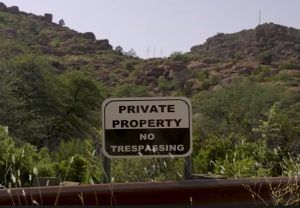
Mahlee Yellowfeather: It was our elders that were involved with the discussions at that time. I was just involved in the fight, in protecting and fighting with my family.
Robert Lundahl: I see. So where do things stand now? Flash forward to the future a little bit from that point.
Mahlee Yellowfeather: Well, we're not going to let them have it, so more likely I would say that we're going to go back to war.
It is sacred grounds and you're not entitled to it. I mean I feel that these people already took enough from everybody.
Robert Lundahl: So does the BLM claim that the government owns it?
Mahlee Yellowfeather: The government thinks they own everything, in Department of Forestry, and everything else, and really they don't.
The Contract
Mahlee Yellowfeather: There are contracts that were put out back when Teddy Roosevelt was around, and that's why we stand our ground.He gave those titles to, uh, Geronimo, which we all possess; there's no government with “D” course of title. We have “D” course of title, so how are they taking possession of something that don't belong to them?”
Robert Lundahl: Short memory?
Mahlee Yellowfeather: And that's like they think they know the story of Ghailee Geronimo, which is not true either. He had a twin brother, it was Gugalah (phonetic), which “thy brother betrayed me.”
Robert Lundahl: So they don't have a right... this is the federal government I'm talking about... they don't have a right. They don't have ownership. You never gave them ownership.
You gave a company the right to mine for one year, from Geronimo, your relative.
And you're afraid, you're saying, that maybe you're going to go to war again, or it's going to be a battle in some manner, right, so what does it look like today? I mean, this is in the news today, and people are trying to become aware of it–you know, we're trying to make people aware of it, so what do they need to know?
We Want Peace
Mahlee Yellowfeather: We want peace. I mean we want peace; we want to be left alone. We want to be able to live in peace and be left alone.We don't want our stuff messed with, especially our sacred grounds. Our people are there. That was the grounds of massacre, of where families were massacred, and that's what makes it more even sacred.
Most of those mountains up there, through there, are just sacred grounds. It's just kind of like Mount Rushmore up in there. Those were all sacred grounds where we used to take off from Four Corners... (with) our (deceased) Warriors and Chiefs and bury them up there, you know, and then they just take it and (say) “Hey it's ours now.” That's why we're still in court with them over that.
You know it's like we have to have some type of, “Hey we're human,” you know.
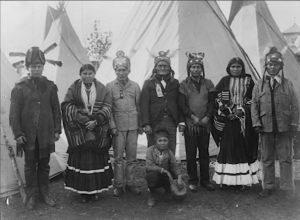
Robert Lundahl: Yeah, it's amazing. 2023 and we're still here.
Mahlee Yellowfeather: We're still here. We're here, and we're still repeating the past.
Robert Lundahl: I was just curious, so if you have burials on the land there are various laws...
Mahlee Yellowfeather: Yes, there are.
Robert Lundahl: So whatever deal they think they made, or whatever they think they have, there are still laws that say you can't do this because of the burials and because of the cultural resources (present there).
Mahlee Yellowfeather: Exactly, we don't use the mine to go make money. It's not about the damn mine, plus we don't want to suck Mother Earth. We're trying to heal Mother Earth.
Robert Lundahl: With all this mining, lithium, copper, gold, everything…
Mahlee Yellowfeather: Gold. Yeah the gold is the number one greed; (that’s) why you're not going to see natives wear it. It's a blood money, right?
Hoka Hey
Robert Lundahl: Can you tell me a little bit about your family? You mentioned that you're related to Geronimo and some people know that story and some people don't, you know, in the public, but he never gave up did he?Mahlee Yellowfeather: No he did not, and he would always say “Hoka Hey,” it's always a good day to die.
He did not die in Fort Sill. (He) actually died right there in Skull Canyon at the base of the tree, the same tree that he pulled his horse up and he took his long walk.
Do you think they're actually going let the most fierce native run the lands, go here, there, there, carrying guns, steal?
I mean you could go to my Pinterest and see all his pictures from the age of youth to the age of hitting 99 years of age.
And the difference between him and Gugala (phonetic), he don't have the scar.
Geronimo had this scar (on his right cheek) he got that at the age of 11 by a bullet graze.
Oh yeah (Gugala) is the one that bond (ed) with the Buffalo society, which is the Lakota, which was Red Cloud’s son.
They are the ones that betrayed, with the Calvary and were slaughtering all the natives within their tribes; they're the ones that slaughtered Sitting Bull and whole tribes, so when Red Cloud heard of it he put his own son to death.
Robert Lundahl: I see, so you're saying that he capitulated.
Mahlee Yellowfeather: What led him (Red Cloud) to that is being honorable to his people of the betrayal of his son.
There is a journal that was written in Ghailee Geronimo’s own hand that we possess as well. My stuff was not Googled, my stuff was, I was born with it in my lap.
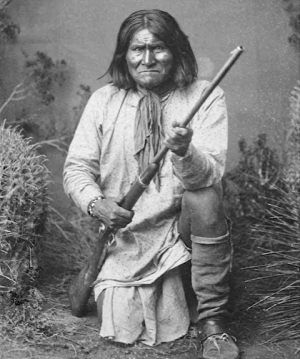 Just like on my other side of my bloodline is the Cherokee.
Just like on my other side of my bloodline is the Cherokee.
I know that the land that Teddy Roosevelt gave Ghailee Geronimo (was) to stop the massacres of everybody and he cut the turtle's tail, that's why the turtle’s tail is not complete for Turtle Island.
The only way the turtle’s tail will ever be united as one is when the last of the Totem, which the Apache, the last of the Totem Nations, unite into the four corners, we will all come together, and this is when we retrieve unity within all tribes.
That's including Canada. Canada used to be free to the open. We used to migrate all the way down, all the way up. All the way down, all the way up.
Robert Lundahl: You used the word migration, so was that over long periods of time, or was that ceremonial?
Mahlee Yellowfeather: It went with the food. Ceremonial, hunts, everything. It was different with the powwows back in their time; it was total unity with the different tribes.
We would have our powwows with different tribes, not outsiders, just within tribes and it would go from different tribes (to) different tribes, and there would be many tribes coming together.
Come in a good way, go in a good way. We would do different hunts, but we would migrate within the food, where the food goes, we went.
Robert Lundahl: I see. What food sources are you talking about? Are you talking about buffalo? Fish?
Mahlee Yellowfeather: Buffalo, fish, yes, everything. They followed the salmon just as much as they followed the buffalo.
Robert Lundahl: Wow, that's covering a lot of miles.
Mahlee Yellowfeather: They followed the horses, the wild horses as well.
Robert Lundahl: So that history is something that, you know, for people that watch a lot of television and Internet, and the modern youth, you know they probably don't quite get it. How do you teach your youth?
Mahlee Yellowfeather: We usually tell them in our story times during powwows or Sundances, gatherings, we tell them. The elders do teachings. I was raised by the elders, you know far back in the canyon. I was learned by the really, really wise elders.
A lot of the children nowadays they have lost their way to even their culture, which is sad– and then not to mention the people and their addictions.
They lie upon the genocide because we're the Seventh Generation; there's a lot of pain and suffering within the tribes, within the people, and this is all over.
But my elders on how, as Apaches, we feel– this is 2023. And a lot of us feel that we cannot sit here and evolve within the pain that we did not endure within the points of the spear.
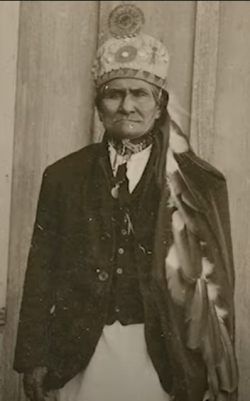 That was not for us to endure. It was left for us to remember and use as strength. Other tribes they swallow upon the pain and use it as a weakness and that's why they're stuck. We move forward.
That was not for us to endure. It was left for us to remember and use as strength. Other tribes they swallow upon the pain and use it as a weakness and that's why they're stuck. We move forward.
We Move Forward
Mahlee Yellowfeather: That's why a lot of our people have already went to the people's schooling in Engineering, working for Lockheed, building the NASA, working for major medicines and hospitals, and evolving with their people.You know- because we can't we cannot live here, not without evolving with them.
Robert Lundahl: What role does Oak Flat have in keeping things together for your tribe and for your people, for your family?
Mahlee Yellowfeather: For our family and ceremony, we stay in prayers. We stay in our blessings. We keep our ceremonies strong.
We don't really discuss ceremonies but I will put this much, that we do have our Warrior ceremonies; we do have our Sundance ceremony–which our Sundance type is for when the girls become their women.
We also have our Ghost Dance. We have our spiritual ceremonies. Just about every day the medicine moms they go, they smudge within the land.
Robert Lundahl: And Oak Flat, so do some of these practices happen there?
Mahlee Yellowfeather: Absolutely.
Robert Lundahl: Regularly? So it's ongoing and this is like life, and the way it's always been, you're not giving it up, and somebody's just trying to take the land out from underneath the culture?
Mahlee Yellowfeather: Absolutely, it is a stronghold part of our culture that we use all the time as part of ceremony, as a remembrance, and keeping. No. We can't let it go.
WATCH the video:
Articles for May 2, 2023 | Articles for May 3, 2023 |


Salem-News.com:


Terms of Service | Privacy Policy
All comments and messages are approved by people and self promotional links or unacceptable comments are denied.
[Return to Top]
©2026 Salem-News.com. All opinions expressed in this article are those of the author and do not necessarily reflect those of Salem-News.com.